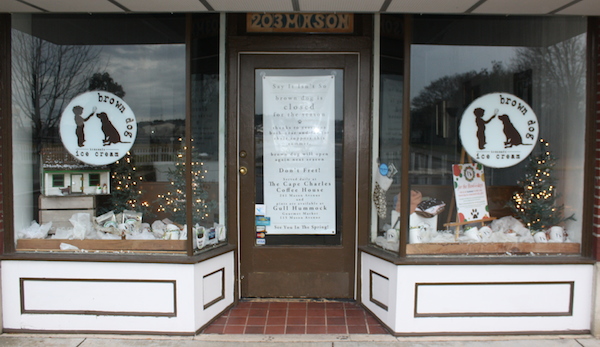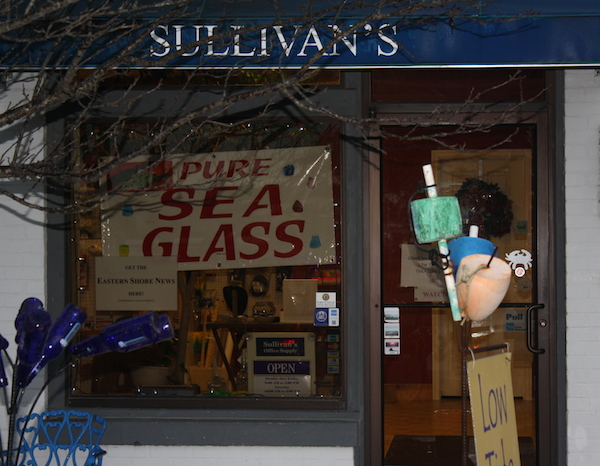LETTER: Town Paying $10,000 for Free Information
February 24, 2014
DEAR EDITOR,
I recently attended a Cape Charles Town Council Meeting and heard that our Town Manager, Heather Arcos, had proposed a wage hour survey be conducted for $10,000 and has already selected her preferred vendor, Springsted Inc., to do the work. Surprisingly, without any discussion, the Mayor and Town Council approved the request. [Read more…]
LETTER: Chief Pruitt Praised for Quick Work
February 24, 2014
DEAR EDITOR,
On January 30, we had an incident at Kings Creek Marina that required medical attention and our staff called 911. [Read more…]
COMMENTARY:
Shore’s Closest Pro Football Team Has Skin in the Game

1983 to present
By WAYNE CREED
February 17, 2014
As Olympians from around the world are meeting in Sochi to compete for gold, two members of Congress, Sen. Maria Cantwell (D-Wash.) and Rep. Tom Cole (R-Okla.) have also forayed into sport by sending a letter to NFL commissioner Roger Goodell, appealing to him to support the effort to change the name of the Washington Redskins. “The National Football League can no longer ignore this and perpetuate the use of this name as anything but what it is: a racial slur,” they write.

1982
Meanwhile, the team and several players have released statements claiming they have received “more than 7,000 letters and emails” in favor of keeping the name, with “almost 200 from people who identified themselves as Native Americans or as family members of Native Americans.” Whether or not the Redskins and the NFL are on the “wrong side of history,” as the senator and representative state, is something to consider. Given that I am married to a Redskins fan, and the Eastern Shore is historically Redskin territory, it might be helpful to review the actual history we may or may not be on the right side of.
The original team dates back to 1932, in Boston, owned by George Preston

1972 -1981
Marshall, Vincent Bendix, Jay O’Brien, and Dorland Doyle. The team played their games at Braves Field, and as a matter of expedience adopted the same name, Boston Braves.
In the first year the team lost $46,000, and Bendix, O’Brien, and Doyle dropped out of the investment, leaving Marshall the sole owner. Marshall, who was having a dispute with his current landlord for the Boston Braves, immediately moved to Fenway Park and changed the name to the “Redskins.” Marshall claimed he did so to honor the team’s coach, Lone Star Dietz, who claimed to be of Native American descent (part Sioux). There is also an account that Marshall chose the

1970-1971
name as an allusion to the Boston Tea Party Patriots that dressed as Native Americans, as a way to send a not so subtle message to his former landlord.
Several years of mediocrity followed until 1936, when the Redskins won their first Eastern Division Title. However, even after winning the title, only 4,000 fans showed up for the final regular season game, at which point a thoroughly disgusted Marshall refused to play the championship game in Boston and instead moved it to the Polo grounds in New York, giving up home field advantage. They lost. [Read more…]
COMMENTARY: Advice to the New School Board
By TED WARNER
February 3, 2014
On Wednesday, January 15, I drove back to Northampton County, across the increasingly overpriced Bay Bridge-Tunnel. I drove around Cape Charles, taking in the familiar streets, and eventually made my way to the Northampton County Public Schools Central Office in order to witness the swearing in ceremony of the county’s first elected school board.
For many of us, the ceremony marked the end of a long process which began several years ago.
Several hundred of us sat in the Old Middle School auditorium to express our outrage over the unceremonious dismissal of a popular high school principal. But there were only eight of us a few weeks later, facing that great, inevitable question: “What’s next?”
Over the next few months, we collaborated closely and struggled to develop a message that was respectful of a long litany of complaints about the state of our public schools, but was also forward-thinking, positive, and would ultimately lead to a positive change in the county. We recognized that the county’s public school administrators and School Board were not responding to needs of teachers, parents, and the community at large. For example, the county’s strategic plan addressed the topic of “community outreach” with only the ominously apathetic words “on going.” That, we felt, was not enough. So we began circulating a petition to create an elected (and not appointed) school board. The petition led to a referendum, which was overwhelming approved by the voting public in November 2012. Then we turned our attention to recruiting candidates for the School Board.
For my part, I was adamant that the candidates be subjected to public scrutiny and that they be asked to articulate an unwavering commitment to involving the expertise of teachers in their deliberations. I firmly believe that almost any problem in our schools can be better solved by a group of teachers, working in the classroom day in and day out, than by Central Office personnel or state-level officials in the Department of Education. Although I was there for every step of this story, I hope that this last point — that the teachers should be more respected — was my contribution.
After a series of public forums, of which the most productive was sponsored by the Northampton County Education Association, a professional association of Northampton’s teachers and support professionals, a group of candidates was selected. In November, the people elected their first school board.
When they raised their hands a week ago and took their oath of office, I hope they realized that although a long story had come to a triumphant conclusion, a new story was beginning. And that story begins with that same great, inevitable question: “What’s next?”
It saddens me that I will not be a part of answering that question. Shortly after the election in November, I accepted a position that required me to move out of the school system. My colleagues congratulated me warmly, and I was grateful for their support. As we all must, my decision to move on was responsible to my family obligations and respectful to the resignation process as defined by School Board policy. I certainly wish that Northampton County could have created the circumstances for me to remain. [Read more…]
COMMENTARY: Why We Might Join the Beach Club
By WAYNE CREED
February 3, 2014
The review of the new Beach Club at Bay Creek in the Wave, which at first appeared to be a rather innocuous report about the general status of the facility, instead seemed to unleash a firestorm of commentary. As usual, the comments section veered off into the weeds, degenerating into a Wrucke vs. Bender UFC cage match, arguments of gated vs. non-gated communities, Bay Creek’s inability to clear snow off the roads, the Wave’s journalistic style, and even intellectually flaccid attacks against members of Old School Cape Charles.
While all this was going on, my wife was reading the article with excitement — years of working in social work, she is the original inspiration for a silver linings playbook. While I’m complaining, “Where’s the bar? How am I going to get my martinis? Do they expect me to survive on just food and water? Never!,” she’s reviewing the amenities, and quite to my surprise offers, “You know, this place is great. And it’s a great deal. Cheaper than the Y.” Stopping me in my tracks, I asked her, “What you talkin’ bout Willis?”
And then she explained. When she was a kid, she belonged to a pool and racquet club in Northern Virginia. In the summers she would spend her days playing tennis, walking over to Roy Rogers for fried chicken, and generally just lounging by the pool. She would also spend one or two weeks visiting cousins in California, who belonged to a magnificent beach club overlooking the Pacific, just north of San Diego. At that moment, I realized that she wasn’t just trying to be Pollyanna — her memories of those times really did make her happy.
Then I thought of my own youth. We also belonged to a club. Looking back, it probably wasn’t much to look at, and compared to what we see at Bay Creek, probably a bit shabby. But it had a big, clean pool, a couple of tennis courts, game room with pool, ping-pong, a few pinball machines, and an excellent snack bar. When Little League baseball ended in mid-June, we were finally cut loose, free to indulge in the lazy days of summer. Me and my friends would sleep late, and then hop on our bikes and ride over to the pool. Pockets stuffed with lawn mowing money, we would swim, play ping-pong, and eat hot dogs and coke all day, until exhausted, we trekked back home to Mom’s dinner table.
Sometimes during the week, when the pool was marginally empty, me and my friend Ronnie would take his dad’s scuba equipment, and the life guard would let us scuba dive in the pool (as long as they could see us). I’m not sure how many hours you need to be certified to dive, but I’m months past that. Ronnie and I would stay under until we completely drained the tanks. Later we would carefully return them to the racks, and Saturday morning, when Ronnie’s dad was checking them before he went on a dive, after discovering they were empty, we could hear his yell, echoing throughout the neighborhood, “RONNIE!” [Read more…]
EDITORIAL: Don’t Ask, Don’t Tell
A CAPE CHARLES WAVE EDITORIAL
January 16, 2014
At 5:15 p.m. today (Thursday), members of Cape Charles Town Council will go behind closed doors at Town Hall for an “executive session.” (The Wave has been criticized in the past for referring to such meetings as “secret.”)
Virginia state law requires almost every action, or even discussion, by publicly elected or appointed bodies to be open to the public, with records available. There are only a few exceptions — personnel matters being the most important. If Town Council wishes to interview candidates for, say, chief of police, the candidates understandably deserve privacy.
But today, Town Council is meeting to consider buying or selling property. That much we know, because state law requires the Town to state the reason for its “executive” session.
Here is the reason provided by the Town Clerk:
Discussion or consideration of the acquisition of real property for a public purpose, or of the disposition of publicly held real property, where discussion in an open meeting would adversely affect the bargaining position or negotiating strategy of the public body. Specifically: Discussion of property leased by the Town and Town-owned property.
So, we know that today Town Council will discuss property leased by the Town, with the idea of buying it, and property owned by the Town, with the idea of selling it. What we don’t know is — just what property?
The only allowance under state law to privately discuss the sale or purchase of property is if “discussion in an open meeting would adversely affect the bargaining position or negotiating strategy” of the Town. Note that any “adverse effect” must be on the Town – not the other party. [Read more…]
LETTER: State Bar President-Elect on Old School Battle

KEVIN MARTINGAYLE
January 15, 2014
DEAR EDITOR,
For well over a year, a group of residents has been battling to save the historic Cape Charles High School from being lost as an historic public asset. I will explain why and suggest a course of action to protect other historic property.
First, the primary excuse for transferring the property to a private developer, for a nominal price, was a supposed need to unload a building that had been allowed to fall into disrepair. Of course, the Town of Cape Charles has ordinances that prohibit allowing property to become dilapidated, so it appears that the local governing body violated its own laws. That type of excuse for disposing of historic property is sad, ironic, and unacceptable.
Second, the deal involving Cape Charles High School converts a public asset into private property, with no public space and no future intended public use. The deal takes a building that was considered to be a part of the public park and allows it to be converted into private residences. The “renovated” building will bear little resemblance to the old high school. This would appear to be contradictory to the Cape Charles Comprehensive Plan, which calls for the preservation of public space.
Third, saving an historic school property like the Cape Charles High School is not complicated to do. The Town of Onancock managed to save the old Onancock High School, and the community is richer for the effort. Many residents urged the Cape Charles Town Council to follow the Onancock example, to no avail. In fact, a competing bid to purchase the school for more money and keep it public was rejected without any Council vote or public discussion. No good reasons were ever offered for the refusal to engage in a serious preservation effort. [Read more…]
COMMENTARY: Signs of Confusion

Violation: “Signs shall not exceed 25 percent of the window area on which such signs are displayed.”
By GEORGE SOUTHERN
Cape Charles Wave
December 24, 2013
Did anyone, other than Cape Charles Town Council member and Planning Commissioner Joan Natali, actually read the new 20-page sign ordinance before voting it into law? Town Planner Rob Testerman says the Town’s attorney reviewed it, but a reader has pointed out that the time restriction on political signs violates Virginia state law.
The new sign ordinance is not only extremely proscriptive – it’s also frustratingly vague. For example:
PERMITS REQUIRED: Unless specifically exempted, a permit must be obtained from the zoning administrator for the erection and maintenance of all signs erected or maintained within this jurisdiction and in accordance with other ordinances of this Jurisdiction.
Does that mean that EVERY sign in town will need a permit? Even temporary signs, such as For Sale signs? The ordinance doesn’t say.
But speaking of permits, there are of course:
PERMIT FEES: Permit fees to erect, alter or relocate a sign shall be in accordance with the fee schedule adopted within this jurisdiction.
No fee schedule is shown.
Do we even know what a “sign” is? Yes, thanks to the ordinance:
SIGN: Any device visible from a public place that displays either commercial or noncommercial messages by means of graphic presentation of alphabetic or pictorial symbols or representations.
So a sign doesn’t even have to contain words. It might be pictures of pumpkins such as were displayed in the windows of the vacant Bi-Lo building on Mason Avenue in October. The signs are gone now, and a good thing, because they are illegal.

VIOLATION: “Pure Sea Glass” banner looks to be well over 25 percent of the window space.
The most restrictive rule in the new ordinance is this one:
WINDOW SIGNS shall be permitted for any nonresidential use in a residential district, and for all commercial and industrial districts, subject to the following limitations:
– Any signs attached to windows or glass walls advertising weekly specials or special services offered for a limited time by a business establishment.
– The aggregate area of all such signs shall not exceed 25 percent of the window area on which such signs are displayed. Window panels separated by muntins or mullions shall be considered as one continuous window area.
One really needs to read this several times before it sinks in. Essentially, it bans all “permanent” signs in storefront windows. Only “weekly specials,” or “limited-time” offers are allowed to be displayed.
But that’s not all – there’s also the size restriction: no more than 25 percent of the window area. [Read more…]



















